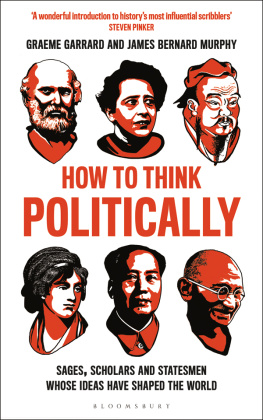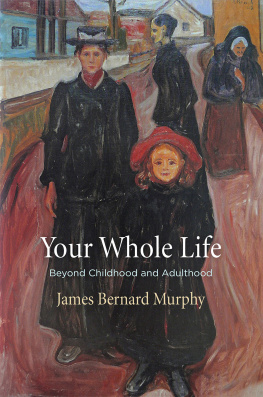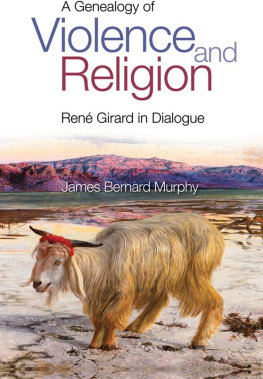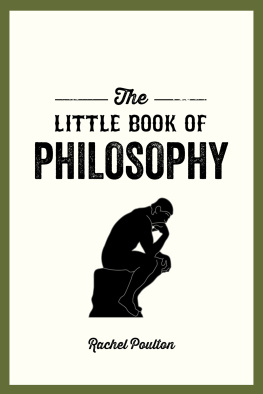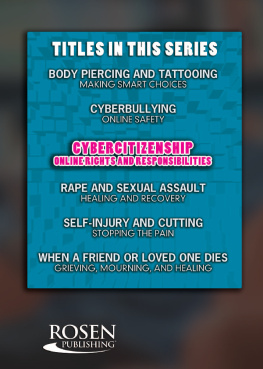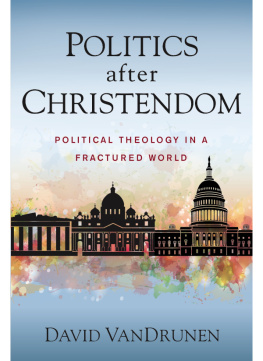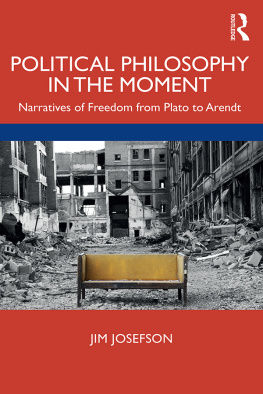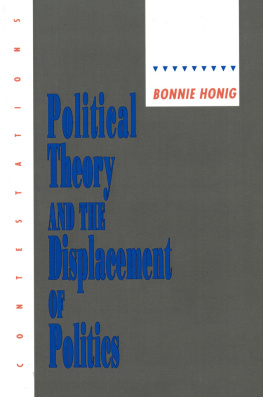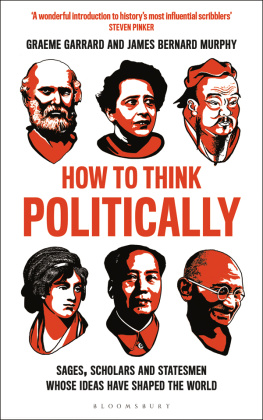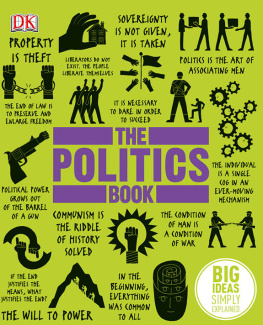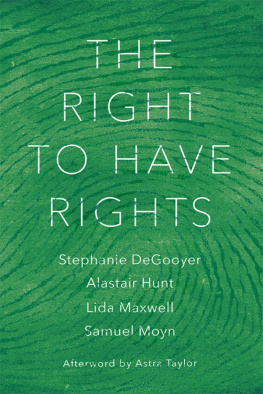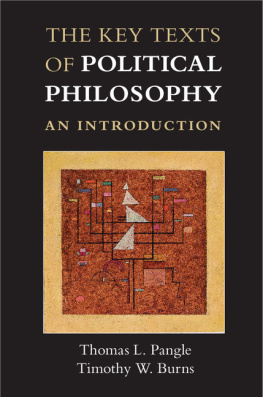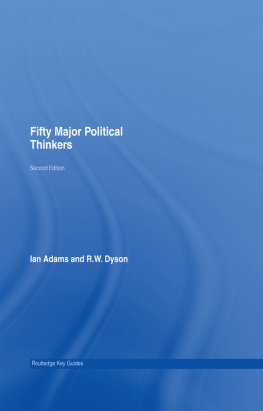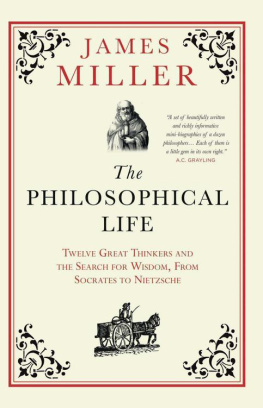
HOW TO THINK
POLITICALLY
BLOOMSBURY CONTINUUM
Bloomsbury Publishing Plc
50 Bedford Square, London, WC 1 B 3 DP , UK
BLOOMSBURY, BLOOMSBURY CONTINUUM and the Diana logo are trademarks of Bloomsbury Publishing Plc
First published in Great Britain 2019
Copyright Graeme Garrard and James Bernard Murphy, 2019
Graeme Garrard and James Bernard Murphy have asserted their right under the Copyright, Designs and Patents Act, 1988, to be identified as Authors of this work
All rights reserved. No part of this publication may be reproduced or transmitted in any form or by any means, electronic or mechanical, including photocopying, recording, or any information storage or retrieval system, without prior permission in writing from the publishers
A catalogue record for this book is available from the British Library
Library of Congress Cataloguing-in-Publication data has been applied for
ISBN: TPB: 9781472961785; ePDF: 9781472961761; ePUB: 9781472961778
To find out more about our authors and books visit www.bloomsbury.com and sign up for our newsletters
To Our Students: Past, Present and Future
CONTENTS
Confucius | 551479 BC |
Plato | c . 428 c . 347 |
Aristotle | 384322 |
Augustine | ad 354430 |
Al-Farabi | c . 872 c . 950 |
Maimonides | 1135 or 11381204 |
Thomas Aquinas | 12251274 |
Niccol Machiavelli | 14691527 |
Thomas Hobbes | 15881679 |
John Locke | 16321704 |
David Hume | 17111776 |
Jean-Jacques Rousseau | 17121778 |
Edmund Burke | 17291797 |
Mary Wollstonecraft | 17591797 |
Immanuel Kant | 17241804 |
Thomas Paine | 17371809 |
G.W. F. Hegel | 17701831 |
James Madison | 17511836 |
Alexis de Tocqueville | 18051859 |
John Stuart Mill | 18061873 |
Karl Marx | 18181883 |
Friedrich Nietzsche | 18441900 |
Mohandas Gandhi | 18691948 |
Sayyid Qutb | 19061966 |
Hannah Arendt | 19061975 |
Mao Zedong | 18931976 |
Friedrich Hayek | 18991992 |
John Rawls | 19212002 |
Martha Nussbaum | 1947 |
Arne Naess | 19122009 |
It is fashionable today to describe politics as a swamp. For many it has become nothing more than a vulgar spectacle of deceit, ambition and opportunism. Trust in our political institutions and leaders has sunk to new lows, and politicians are held in greater contempt than for generations. Voter anger and disenchantment are growing at an alarming rate. Distracted by all the unseemly squabbling of politics, we end up allowing markets and bureaucrats to make decisions for us, leaving citizens resigned and alienated from politics-as-usual. It is very hard to imagine that ideas, let alone ideals, could play any part in all of this.
But politics has always been a messy business, governed more by expediency and compromise than by lofty ideals and principles, however much lip-service is paid to the latter. It is usually a very rough and nasty game, a Game of Thrones, dominated by conflicting interests, emotions, wealth and power. Much of the time its just a low-down, dirty business, an evil-smelling bog, as one nineteenth-century British politician (the prime minister Lord Rosebery) called it. So shameful is political manoeuvring that it has largely been conducted behind closed doors: no decent person, it has been said, wants to observe sausages or laws being made.
This common view of politics is partially true, but it is not the whole truth. Perhaps more than in any other arena, politics shows humans at their worst and their best. We are all too familiar now with the worst; our book reminds readers of the best in an age when it is not often apparent, but when it needs to be, given what is at stake. In what follows we will show how politics is actually a place where ideas and ideals meet concrete reality, and where great words and great deeds mix with base motives and low intrigue.
At its best, politics can be a great and civilizing human activity, as the political theorist Bernard Crick described it in his defence of the art. It is the alternative to controlling people by force or fraud alone. Crick is right that politics can be and has been used for good and deliberate ends, and history provides abundant examples of this. It is capable of a moral nobility and an intellectual depth foreign to the present age of reality TV and government by Twitter, as you will see in what follows. Politics is the arena in which the fate of our planet will be decided. That is why, as citizens, we have a responsibility to engage with politics. To paraphrase Leon Trotsky: you may not care about politics but politics cares about you.
We assume that citizens should be informed. But they also need to be knowledgeable and even wise. Today we are inundated with information but knowledge and wisdom remain as scarce as ever. Thanks to the miracles of digital technology, we are drowning in oceans of data, facts and opinions. What we need now is not more information but more insight, not more data but more perspective, not more opinions but more wisdom. After all, much of what is called information is actually misinformed, and most opinions fall short of true knowledge, let alone wisdom. Even a superficial glance at the state of contemporary politics will dispel any illusion that the explosion of information has led to wiser citizens or politicians or improved the quality of public debate. If anything, misinformation is winning out over knowledge.
How to Think Politically will help you to move beyond political information to acquire knowledge and, from there, wisdom. Information is about facts and is specific. Knowledge is more general and implies understanding and analysis. Wisdom is the highest and deepest form of insight into the reality of something. We invite you to eavesdrop upon a set of conversations among the wisest students of politics in history. In 30 short chapters you will be introduced to a diverse and fascinating cast of characters, ranging from Confucius, the wandering sage of ancient China, to Arne Naess, the modern mountaineer and ecologist, from Al-Farabi, the Muslim imam, to Hannah Arendt, the exiled German Jewish intellectual, and from Plato, the Greek philosopher, to John Rawls, the American professor.
In this book we interweave stories from the life and times of each thinker with discussion of their key insights about politics, broadly understood. All of them attempted to distil the political information of their age into genuine knowledge and to turn that knowledge into general wisdom about how to live well, as individuals and as communities. We have chosen 30 of the wisest and most influential political thinkers in history from Asia, Africa, Europe and America. We conclude each chapter with reflections on the wisdom that each sage offers for todays political challenges.
Next page
